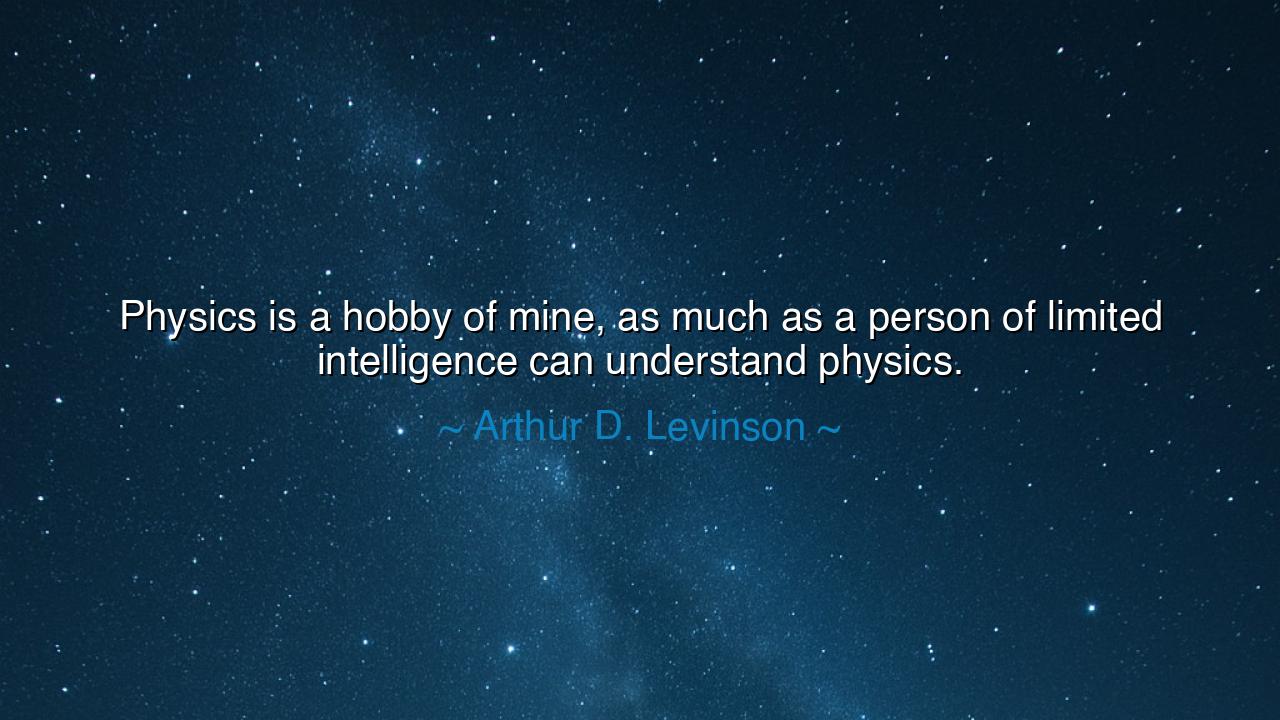
Physics is a hobby of mine, as much as a person of limited
Physics is a hobby of mine, as much as a person of limited intelligence can understand physics.






“Physics is a hobby of mine, as much as a person of limited intelligence can understand physics.” – Arthur D. Levinson
Hear, O seeker of wisdom, the humble words of Arthur D. Levinson, a man whose life’s work bridged the realms of science and leadership, of innovation and introspection. Though he speaks lightly, almost with jest, his words conceal a deep river of humility and reverence for the vastness of knowledge. When he says, “as much as a person of limited intelligence can understand physics,” he does not belittle himself, but pays tribute to the infinite complexity of nature, to the majesty of physics, that most fundamental of sciences, which dares to reveal the hidden laws governing all existence.
Levinson, known for his leadership at Genentech and Apple, was not a physicist but a biochemist—yet his curiosity extended beyond the boundaries of his own field. To him, physics was not merely a discipline but a hobby, a joyful exploration of the universe’s language. His statement is born of the recognition that even the most brilliant among us stand in awe before the mysteries of the cosmos. The deeper one studies, the more one realizes how little one truly knows. Thus, his self-effacing tone carries the wisdom of the ancients: that humility is the beginning of understanding, and that true intelligence lies in wonder.
For in truth, physics is not just the study of matter and motion—it is the study of being itself. It peers into the atom and finds universes within; it gazes at the stars and sees patterns that bind galaxies together. To call such a field one’s “hobby” is not an act of arrogance, but of devotion. It is akin to a monk saying he loves the study of divinity, knowing that the divine can never be fully grasped. So too does Levinson express a reverence that transcends knowledge: he studies not to master, but to marvel. He reminds us that the pursuit of understanding, no matter how small, is itself a noble act—that even limited minds may partake in infinite truths.
There is an ancient echo of this sentiment in the words of Socrates, who proclaimed that the wisest man is he who knows that he knows nothing. So it is with Levinson and the scientists who have come before him. Isaac Newton, after discovering the laws of gravity and motion, once said, “I seem to have been only like a boy playing on the seashore, while the great ocean of truth lay all undiscovered before me.” And Albert Einstein, whose mind reshaped the fabric of space and time, declared that the more he learned, the more mysterious the universe became. The greatest minds are united not by certainty, but by humility—the recognition that the vastness of creation dwarfs the intellect of any one human being.
To approach physics as a hobby, as Levinson did, is therefore to engage in a sacred form of play—the play of the mind with the infinite. It is to return to the childlike curiosity that once drove the philosophers of old to look at the stars and ask, “What is this world made of?” It is a reminder that wisdom need not always wear the robe of solemnity; sometimes it comes clothed in laughter, in modesty, in the quiet joy of discovery. Even the phrase “limited intelligence” becomes a form of wisdom, for it acknowledges that no human mind can hold the totality of truth—but that we are blessed simply to glimpse it.
Let this be a lesson, then, to all who walk the path of learning: do not measure your worth by how much you know, but by how deeply you wonder. The universe does not require mastery—it invites curiosity. The poet, the philosopher, and the scientist are all bound by the same yearning: to peer beyond the visible, to understand what moves the stars and stirs the soul. You need not be a genius to love knowledge; you need only a humble heart and an open mind.
So, my child of the cosmos, take Levinson’s words to heart. Approach every discipline, every mystery, with humility and delight. Let learning be your play and curiosity your prayer. If you find yourself daunted by complexity, remember that even the wisest stand at the edge of ignorance. Study not to boast, but to behold; not to conquer, but to connect. For in acknowledging the limits of your mind, you open yourself to the boundlessness of truth.
Thus, the meaning of Levinson’s words is eternal: that the path to wisdom is paved not with pride, but with wonder. To love physics, or any science, as a humble admirer is to share in the joy of creation itself—to touch, if only faintly, the pulse of the divine order that beats beneath all things. And that, indeed, is the truest intelligence of all.






AAdministratorAdministrator
Welcome, honored guests. Please leave a comment, we will respond soon